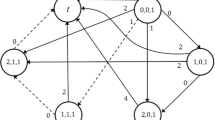Abstract
This paper considers single machine scheduling with past-sequence-dependent (psd) delivery times, in which the processing time of a job depends on its position in a sequence. We provide a unified model for solving single machine scheduling problems with psd delivery times. We first show how this unified model can be useful in solving scheduling problems with due date assignment considerations. We analyze the problem with four different due date assignment methods, the objective function includes costs for earliness, tardiness and due date assignment. We then consider scheduling problems which do not involve due date assignment decisions. The objective function is to minimize makespan, total completion time and total absolute variation in completion times. We show that each of the problems can be reduced to a special case of our unified model and solved in O(n 3) time. In addition, we also show that each of the problems can be solved in O(nlogn) time for the spacial case with job-independent positional function.
Similar content being viewed by others
References
Adamopoulos, G.I., Pappis, C.P.: Single machine scheduling with flow allowances. J. Oper. Res. Soc. 47, 1280–1285 (1996)
Bachman, A., Janiak, A.: Scheduling jobs with position-dependent processing times. J. Oper. Res. Soc. 55, 257–264 (2004)
Biskup, D.: Single-machine scheduling with learning considerations. Eur. J. Oper. Res. 115, 173–178 (1999)
Biskup, D.: A state-of-the-art review on scheduling with learning effects. Eur. J. Oper. Res. 188, 315–329 (2008)
Cheng, T.C.E., Wu, C.C., Lee, W.C.: Some scheduling problems with sum-of-processing-times-based and job-position-based learning effects. Inf. Sci. 178, 2476–2487 (2008)
Cheng, T.C.E., Wu, C.C., Lee, W.C.: Some scheduling problems with deteriorating jobs and learning effects. Comput. Ind. Eng. 54, 972–982 (2008)
Cheng, T.C.E., Lee, W.C., Wu, C.C.: Scheduling problems with deteriorating jobs and learning effects including proportional setup times. Comput. Ind. Eng. 58, 326–331 (2010)
Cheng, T.C.E., Lee, W.C., Wu, C.C.: Single-machine scheduling with deteriorating jobs and past-sequence-dependent setup times. Appl. Math. Model. 35, 1861–1867 (2011)
Cheng, T.C.E., Wu, C.C., Chen, J.C., Wu, W.H., Cheng, S.R.: Two-machine flowshop scheduling with a truncated learning function to minimize the makespan. Int. J. Prod. Econ. 141, 79–86 (2013)
Hardy, G.H., Littlewood, J.E., Polya, G.: Inequalities. Cambridge University Press, Cambridge (1967)
Janiak, A., Rudek, R.: Scheduling jobs under an aging effect. J. Oper. Res. Soc. 60, 1–8 (2009)
Kanet, J.J.: Minimizing variation of flow time in a single machine systems. Manag. Sci. 27, 1453–1459 (1981)
Kim, B.L., Ozturkoglu, Y.: Scheduling a single machine with multiple preventive maintenance activities and position-based deteriorations using genetic algorithms. Int. J. Adv. Manuf. Technol. 67, 1127–1137 (2013)
Koulamas, C., Kyparisis, G.J.: Single-machine scheduling problems with past-sequence-dependent delivery times. Int. J. Prod. Econ. 126, 264–266 (2010)
Kuo, W.H., Yang, D.L.: Minimizing the makespan in a single-machine scheduling problem with the cyclic process of an aging effect. J. Oper. Res. Soc. 59, 416–420 (2008)
Lee, W.C., Wu, C.C., Sung, H.J.: A bi-criterion single-machine scheduling problem with learning considerations. Acta Inform. 40, 303–315 (2004)
Liman, S.D., Panwalkar, S.S., Thongmee, S.: Common due window size and location determination in a single machine scheduling problem. J. Oper. Res. Soc. 49, 1007–1010 (1998)
Liu, M., Zheng, F.F., Chu, C.B., Xu, Y.F.: New results on single-machine scheduling with past-sequence-dependent delivery times. Theor. Comput. Sci. 438, 55–61 (2012)
Mosheiov, G.: Scheduling problems with a learning effect. Eur. J. Oper. Res. 132, 687–693 (2001)
Mosheiov, G.: Parallel machine scheduling with a learning effect. J. Oper. Res. Soc. 52, 1165–1169 (2001)
Mosheiov, G., Sidney, J.B.: Scheduling with general job-dependent learning curves. Eur. J. Oper. Res. 147, 665–670 (2003)
Mosheiov, G.: A note on scheduling deteriorating jobs. Math. Comput. Model. 41, 883–886 (2005)
Mosheiov, G.: Proportionate flowshops with general position-dependent processing times. Inf. Process. Lett. 111, 174–177 (2011)
Ozturkoglu, Y., Bulfin, R.L.: A unique integer mathematical model for scheduling deteriorating jobs with rate-modifying-activities on a single machine. Int. J. Adv. Manuf. Technol. 57, 753–762 (2011)
Panwalkar, S.S., Smith, M.L., Seidmann, A.: Common due date assignment to minimize total penalty for the one machine scheduling problem. Oper. Res. 30, 391–399 (1982)
Rustogi, K., Strusevich, V.A.: Simple matching vs. linear assignment in scheduling models with positional effects: a critical review. Eur. J. Oper. Res. 222, 393–407 (2012)
Seidmann, A., Panwalkar, S.S., Smith, M.L.: Optimal assignment of due dates for a single processor scheduling problem. Int. J. Prod. Res. 19, 393–399 (1981)
Wu, C.C., Lee, W.C., Chen, T.: Heuristic algorithms for solving the maximum lateness scheduling problem with learning considerations. Comput. Ind. Eng. 52, 124–132 (2007)
Wu, C.C., Lee, W.C.: Single-machine and flowshop scheduling with a general learning effect model. Comput. Ind. Eng. 56, 1553–1558 (2009)
Wu, C.C., Hsu, P.H., Chen, J.C., Wang, N.S.: Genetic algorithm for minimizing the total weighted completion time scheduling problem with learning and release times. Comput. Oper. Res. 38, 1025–1034 (2011)
Yang, D.L., Cheng, T.C.E., Kuo, W.H.: Scheduling with a general learning effect. Int. J. Adv. Manuf. Technol. 67, 217–229 (2013)
Yang, S.J., Yang, D.L.: Single-machine scheduling problems with past-sequence-dependent delivery times and position-dependent processing times. J. Oper. Res. Soc. 63, 1508–1515 (2012)
Zhao, C.L., Tang, H.Y.: Single machine scheduling with general job-dependent aging effect and maintenance activities to minimize makespan. Appl. Math. Model. 34, 837–841 (2010)
Author information
Authors and Affiliations
Corresponding author
Rights and permissions
About this article
Cite this article
Zhao, C., Tang, H. Single machine scheduling problems with general position-dependent processing times and past-sequence-dependent delivery times. J. Appl. Math. Comput. 45, 259–274 (2014). https://doi.org/10.1007/s12190-013-0722-9
Received:
Published:
Issue Date:
DOI: https://doi.org/10.1007/s12190-013-0722-9




